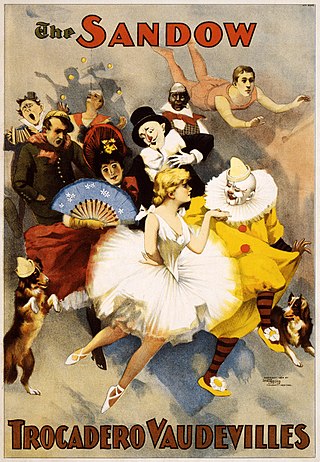
Vaudeville is a theatrical genre of variety entertainment which began in France at the end of the 19th century. A vaudeville was originally a comedy without psychological or moral intentions, based on a comical situation: a dramatic composition or light poetry, interspersed with songs or ballets. It became popular in the United States and Canada from the early 1880s until the early 1930s, while changing over time.

Sophie Tucker was an American singer, comedian, actress, and radio personality. Known for her powerful delivery of comical and risqué songs, she was one of the most popular entertainers in the U.S. during the first half of the 20th century. She was known by the nickname "the Last of the Red-Hot Mamas".
Trixie Smith, was an American blues singer and film actress. She made four dozen recordings and appeared in five films.

Ida M. Cox was an American singer and vaudeville performer, best known for her blues performances and recordings. She was billed as "The Uncrowned Queen of the Blues".

Daphne Pollard was an Australian-born vaudeville performer and dancer, active on stage and later in US films, mostly short comedies.

Trixie Friganza was an American actress. She began her career as an operetta soubrette, working her way from the chorus to starring in musical comedies to having her own feature act on the vaudeville circuit.

Winifred Emms, best known by her stage name Hetty King, was an English entertainer who performed in the music halls as a male impersonator over some 70 years.

Helen Trix was an American dancer, singer, and song composer. The August 1906 edition of Edison Phonograph Monthly describes her as having a "clear, well modulated contralto voice".
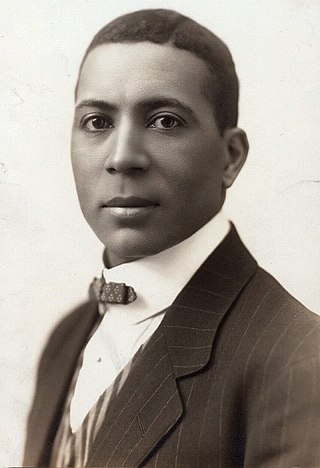
Sherman Houston Dudley was an African-American vaudeville performer and theatre entrepreneur. He gained notability in the late nineteenth and early twentieth century as an individual performer, a composer of ragtime songs, and as a member and later owner of various minstrel shows including the Smart Set Company. Dudley is also notable as one of the first African Americans to combine business with theater, by starting a black theater circuit, in which theaters were owned or operated by African Americans and provided entertainment by and for African Americans. He created the first black operated vaudeville circuit and led the way for what became the Theatre Owners Booking Association (T.O.B.A.).

George Walker was an American vaudevillian, actor, and producer. In 1893, in San Francisco, Walker at the age of 20 met Bert Williams, who was a year younger. The two young men became performing partners. Walker and Williams appeared in The Gold Bug (1895), Clorindy (1898), The Policy Player (1899), Sons of Ham (1900), In Dahomey (1903), Abyssinia (1906), and Bandanna Land (1907). Walker married dancer Ada Overton, who later also was a choreographer.

Anita Bush was an African American stage actress and playwright. She founded the Anita Bush All-Colored Dramatic Stock Company in 1915, a pioneering black repertory theatre company that helped gain her the moniker "The Little Mother of Colored Drama".
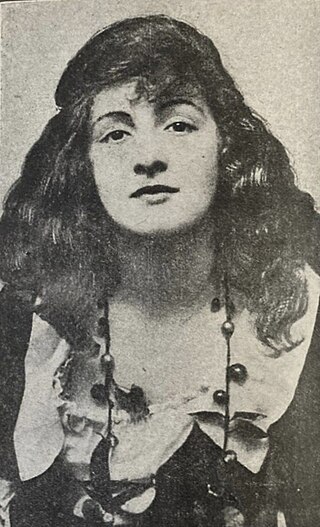
Daisy Burrell was a British stage actress and Edwardian musical comedy performer who also appeared as a leading lady in silent films and in pantomime.
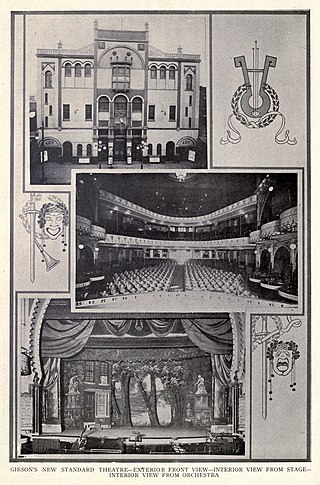
The Standard Theatre showcased Philadelphia's most talented African-American performers and jazz musicians in the early twentieth century. During its peak years (1915–1930), the Standard was one of Philadelphia's most famous and successful black theaters. Its exceptional success can be attributed to its owner, John T. Gibson, an African-American man who envisioned affordable entertainment for people of color.
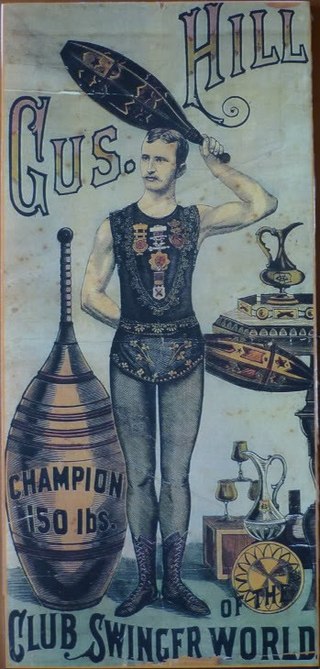
Gus Hill was an American vaudeville performer who juggled Indian clubs. He later became a burlesque and vaudeville entrepreneur. Hill was one of the founders of the Columbia Amusement Company, an association of burlesque shows and theaters, and became president of the American Burlesque Association. He also staged drama and musical comedies. He launched a highly popular series of "cartoon theatricals", musical comedies based on comic strips or cartoons. At one time he was running fourteen different shows.

Ray Cox was an early 20th century American actress and vaudeville performer.

The Whitman Sisters were four African-American sisters who were stars of Black Vaudeville. They ran their own performing touring company for over forty years from 1900 to 1943, becoming the longest-running and best-paid act on the T.O.B.A. circuit. They comprised Mabel (May) (b. Ohio; 1880–1942), Essie (Essie Barbara Whitman; b. Osceola, Arkansas, July 4, 1882 – May 7, 1963), Alberta "Bert" (b. Kansas; 1887–1964) and Alice (b. Georgia; 1900–December 29, 1968).

Edna Howland was an American vaudeville artist. She was best known for her piano playing and soprano voice. Between 1910 and 1920, she toured with Jack Kammerer, an acrobatic comedian. Billed as Kammerer & Howland, the duo described themselves as a "Classical Comedy Singing and Talking Act", and as performers of "Jollity and Jingles Mirthfully Mingled". She retired from show business in the early 1920s.

Gertie Brown Moore was a vaudeville performer and one of the first African-American film actresses. Brown is most famous for her part in the 1898 silent film Something Good – Negro Kiss, which went viral in 2018.

Nora Bayes was an American singer and vaudeville performer who was popular internationally between the 1900s and 1920s. She is credited with co-writing the song "Shine On, Harvest Moon" and performed many successful songs during the First World War, including "Over There". She was also noted for her independent views and unconventional private life, becoming an early media celebrity. She made over 160 recordings.
James Maurice Barry and his wife Josephine Barry were American vaudeville entertainers, who were usually billed as Mr. and Mrs. Jimmy Barry.



















